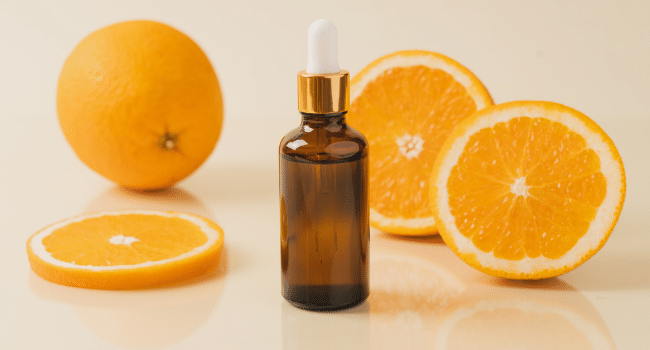Table of Contents
Winter can be extremely harsh on your skin. The drop in temperature, lack of humidity, and constant exposure to indoor heating create the perfect storm for dryness, dullness, and sensitivity. This is where vitamin C serum becomes one of the most powerful winter skincare essentials. Known for its brightening, hydrating, and protective properties, vitamin C can transform how your skin looks and feels during cold months. If you’re wondering why skincare experts recommend it so strongly for winter, this guide covers everything you need to know.
Why Winter Takes a Toll on Your Skin
As soon as winter arrives, most people start noticing rough patches, flakiness, tightness, and a dull complexion. This happens because of a mix of environmental and lifestyle factors that weaken the skin barrier.
Cold Air, Wind, and Low Humidity
Outdoor winter air is naturally dry and cold. When humidity drops, your skin loses moisture faster. Harsh winds further strip away natural oils, making your skin feel tight and dehydrated. This moisture imbalance leads to faster barrier damage and increased sensitivity.
Indoor Heating and Moisture Loss
Heaters and blowers create warm, dry indoor environments. While they make you feel comfortable, they pull moisture from your skin — resulting in consistent dehydration throughout the day. This constant shift from cold outdoors to warm indoors accelerates moisture loss.
How These Factors Damage Your Skin Barrier
When the skin barrier weakens, your skin struggles to retain hydration and becomes more vulnerable to irritation. This leads to redness, dullness, breakouts, and rough texture — all common winter complaints.
What Makes Vitamin C a Winter Skincare Essential
Vitamin C is one of the most researched skincare ingredients, and its benefits become even more powerful during winter.
1. Strong Antioxidant Protection in Harsh Weather
Winter doesn’t reduce your exposure to free radicals. Pollution, UV rays, and cold wind still affect your skin. Vitamin C neutralizes these free radicals, helping protect your skin from environmental stressors that cause premature aging and dullness.
2. Helps Brighten Dull, Tired Winter Skin
Dehydration and slow cell turnover during winter can make skin appear grey, patchy, and lifeless. Vitamin C boosts radiance, evens out skin tone, and reduces winter dullness by increasing skin renewal.
3. Supports Collagen for Firmer, Healthier Skin
Vitamin C helps stimulate collagen production — crucial during winter when skin becomes more fragile. This leads to firmer, plumper, and healthier-looking skin even when the weather is harsh.
Key Benefits of Vitamin C Serum Specifically in Winter
Fights Dryness and Dehydration
Winter dryness increases transepidermal water loss. Vitamin C strengthens the barrier, helping your skin retain moisture better. When paired with hydrating ingredients, it reduces flaky patches and improves overall softness.
Reduces Redness and Sensitivity
Cold temperatures often trigger redness, irritation, and sensitivity. Vitamin C has anti-inflammatory properties that help calm inflamed skin and reduce the appearance of red, blotchy areas.
Enhances Sun Protection (Yes, UV Is Still Strong in Winter!)
Many people assume they don’t need sunscreen in winter — but UV rays remain strong even on cloudy days. Vitamin C boosts the effectiveness of SPF by fighting UV-induced free radicals, giving you an extra layer of protection.
How to Use Vitamin C Serum in Your Winter Routine
Ideal Application Order
Use vitamin C serum after cleansing and before moisturizer. Morning use is preferable because it strengthens sun protection and keeps your skin glowing throughout the day.
AM routine:
- Cleanser
- Vitamin C serum
- Moisturizer
- Sunscreen
Pairing Vitamin C with Hydrating Ingredients
Winter skincare is all about layering hydration. Combine vitamin C with ingredients like:
- Hyaluronic acid for deep hydration
- Ceramides to repair the barrier
- Squalane or glycerin to lock in moisture
These combinations minimize irritation and maximize glow.
Mistakes to Avoid in Cold Weather
- Don’t apply vitamin C on extremely dry or peeling skin.
- Avoid pairing with exfoliants in the same routine if your skin feels sensitive.
- Don’t skip moisturizer — winter demands extra hydration.
Who Should (and Shouldn’t) Use Vitamin C in Winter
Best Skin Types for Vitamin C
Normal, oily, combination, and dry skin types benefit from vitamin C during colder months. It helps brighten, hydrate, and strengthen the skin barrier.
Precautions for Sensitive or Rosacea-Prone Skin
If you have highly reactive skin:
- Start with a low concentration (5–10%)
- Use it every alternate morning
- Always layer with a soothing, hydrating moisturizer
Patch testing is essential.
Recommended Winter Routine Featuring Vitamin C Serum
Morning Routine:
- Gentle hydrating cleanser
- Vitamin C serum
- Hyaluronic acid (optional)
- Ceramide moisturizer
- SPF 30 or higher
Night Routine:
- Cleanser
- Hydrating toner or essence
- Moisturizer
- Facial oil (optional for very dry skin)
Why Deconstruct’s Vitamin C Serum Is Winter-Friendly
Ferulic acid is a powerful antioxidant that strengthens the performance of vitamin C, helping it stay stable and effective in winter’s fluctuating temperatures. This combination makes vitamin C gentler on dry or dehydrated skin. The Deconstruct Vitamin C Serum follows this ingredient philosophy, offering brightening and barrier-supporting benefits that fit naturally into a winter skincare routine.
Final Thoughts
Vitamin C serum is one of the most effective winter skincare essentials to fight dullness, dryness, sensitivity, and environmental damage. When used consistently, it keeps your skin bright, hydrated, and healthy throughout the cold months. Adding it to your winter routine is a simple step that delivers visible, long-term benefits.
